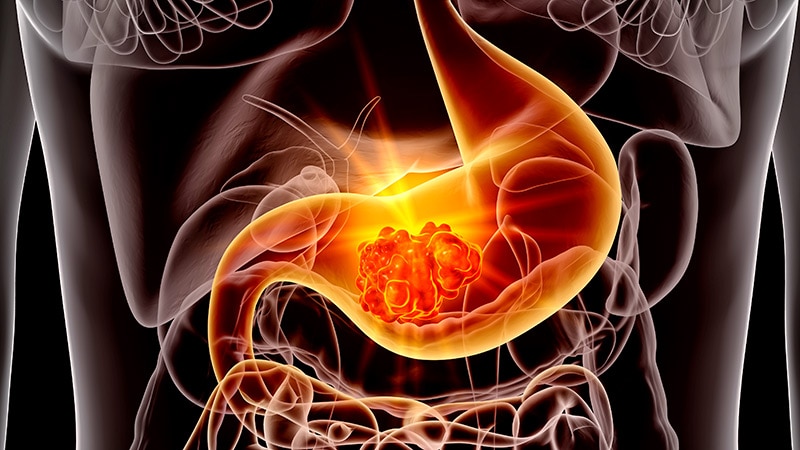Gene Variants and H. pylori Increase Gastric Cancer Risk
Alapfogalmak
Specific gene mutations combined with H. pylori infection significantly increase gastric cancer risk.
Kivonat
The content discusses a study from Japan that reveals how specific gene mutations, combined with H. pylori infection, can significantly increase the risk of gastric cancer. The study analyzed samples from over 10,000 patients with gastric cancer and identified nine genes associated with an increased risk. The findings suggest that hereditary factors play a more significant role in gastric cancer risk than previously thought.
Highlights:
- H. pylori infection is linked to gastric ulcers and cancer.
- Specific gene mutations increase gastric cancer risk.
- Hereditary factors play a crucial role in gastric cancer risk.
- Study analyzed samples from over 10,000 patients.
- Nine genes associated with increased gastric cancer risk were identified.
- Homologous recombination genes are involved in tumorigenesis.
- Evaluation and eradication of H. pylori infection may be crucial for carriers of gene mutations.
- Environmental factors contributing to carcinogenesis may have been overlooked.
Összefoglaló testreszabása
Átírás mesterséges intelligenciával
Hivatkozások generálása
Forrás fordítása
Egy másik nyelvre
Gondolattérkép létrehozása
a forrásanyagból
Forrás megtekintése
www.medscape.com
Gene Variants Plus H pylori Increase Risk of Gastric Cancer
Statisztikák
The cumulative risk for gastric cancer at age 85 among carriers of gene variants infected with H. pylori was 45.5%.
The risk for gastric cancer was less than 5% among those without H. pylori infections.
Idézetek
"Our results suggest that in persons known to carry a pathogenic variant in a homologous-recombination gene, evaluation and eradication of H. pylori infection may be particularly important." - Usui and colleagues
"It is remarkable that pathogenic variants in homologous-recombination genes drive tumorigenesis only in the context of H. pylori infection." - Anne Müller, PhD, and Jiazhuo He, MD
Főbb Kivonatok
by Neil Osterwe... : www.medscape.com 03-29-2023
https://www.medscape.com/viewarticle/990241
Mélyebb kérdések
How can the findings of this study impact genetic screening for gastric cancer?
The findings of this study suggest that specific mutations in genes associated with DNA repair, when combined with H. pylori infection, significantly increase the risk of gastric cancer. This implies that genetic screening for gastric cancer should not only focus on identifying germline pathogenic variants in genes associated with homologous recombination but also take into account the presence of H. pylori infection. Screening individuals known to carry pathogenic variants in homologous-recombination genes for H. pylori infection may be crucial in assessing their risk for gastric cancer. Therefore, genetic screening protocols may need to be updated to include evaluation and eradication of H. pylori infection in individuals with specific gene mutations associated with gastric cancer.
What are the implications of overlooking environmental factors in carcinogenesis?
Overlooking environmental factors in carcinogenesis can have significant implications on understanding the development of cancer. This study highlights the interaction between genetic predisposition (germline pathogenic variants in DNA repair genes) and an environmental factor (H. pylori infection) in increasing the risk of gastric cancer. If environmental factors like H. pylori infection are not considered in cancer research and treatment strategies, important risk factors may be missed, leading to incomplete assessments of cancer risk. Understanding the role of environmental factors in carcinogenesis is crucial for developing comprehensive prevention and treatment strategies that take into account both genetic and environmental influences on cancer development.
How might the role of H. pylori in gastric cancer development influence treatment strategies?
The role of H. pylori in gastric cancer development can influence treatment strategies in several ways. Since this study suggests that pathogenic variants in homologous-recombination genes drive tumorigenesis specifically in the context of H. pylori infection, evaluating and eradicating H. pylori infection in individuals with these gene mutations may be particularly important. This finding implies that treatment strategies for individuals with genetic predispositions to gastric cancer should include screening for and addressing H. pylori infection. Additionally, understanding the interaction between H. pylori and genetic factors in gastric cancer development may lead to the development of targeted therapies that address both the genetic and environmental components of the disease. This integrated approach to treatment could potentially improve outcomes for individuals at risk of developing gastric cancer.
0
